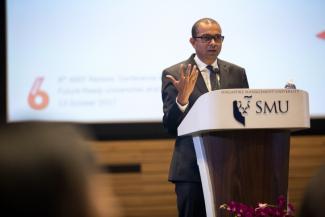
The sixth edition of the ASEF Rectors’ Conference and Students’ Forum (ARC6), which took place in Singapore for the first time, came to a close on 13 October 2017. Dr Janil Puthucheary, Singapore’s Senior Minister of State for Education delivered a keynote address on Singapore’s approach to developing quality education to prepare globalised and future-ready citizens.
Organised by the Singapore Management University (SMU), in partnership with Asia-Europe Foundation (ASEF), ARC6 addressed key issues shaping the education landscape in Asia and Europe. More than 200 university leaders, higher education experts, business representatives, government officials and student leaders from 51 Asian and European countries gathered at SMU for the five-day programme. The discussions by students and rectors at ARC6 the resulted in a set of policy recommendations that will be discussed by 51 education ministers during the upcoming 6th Asia-Europe Meeting (ASEM) Ministers’ Meeting, on 21-22 November 2017 in Seoul, Korea.

This year, ARC6 was themed “Future-ready Universities and Graduates: Quality Education Beyond the Horizon”, with a focus on three areas: i. Interdisciplinarity in Education and Research; ii. Lifelong Learning: Holistic and Global Education; and iii. Access to Quality Education. To encourage discussion and debate on these topics, ARC6 engaged university leaders and students in panel sessions, action-focused workshops, reverse-mentoring sessions and networking receptions, including an Asia-Europe cultural evening.
The Students’ Forum, which took place from 9 to 12 October, gave a platform for student leaders and young academics to voice their perspectives on the role students play in ensuring an inclusive education ecosystem for all. University rectors, to whom student participants presented their policy recommendations, were encouraged by students’ commitment towards contributing to society, even beyond graduation from university.
Mr Kelvin Fan, President of the SMU Ambassadorial Corps, who led a reverse-mentoring session with a group of 20 Asian and European rectors, shared, “Today’s youths face increasingly complex experiences and multi-faceted challenges. This necessitates both an interdisciplinary approach, one that facilitates the sharing of diverse perspectives and learning through experiences, as well as a team approach, where the educator and student collaborate with other sectors of society to impact the world positively.”
One of the key points discussed at ARC6 focused on the fact that in today’s volatile, uncertain, complex and ambiguous (VUCA) world, it is imperative for curriculum to be more multi-disciplinary, forward-thinking, and relevant to society and its requirements.
This was addressed by Dr Puthucheary, in his keynote speech: “How do you cope with the fact that the education you have may not perfectly prepare you for your first, second, third or whatever number of jobs?
In a world where there is so much uncertainty, the one thing that they [young people] need to take away from their education is adaptability. And the need then to be able to continually learn, to be resilient about that process of losing jobs and become comfortable with change and uncertainty.”
Underscoring the importance of lifelong learning, Dr Puthucheary said: “Ultimately, we need to re-tool and re-focus on the efforts of our Institutes of Higher Learning. This journey has already started, to pay a lot more attention to adult learning. The provision of education for adults is not an after-thought. It is not a nice-to-have, nor an extra-curricular activity. It should and needs to remain at the heart of the tertiary education process, and that what we provide for pre-employment for the young undergraduate need not fundamentally be different from that process of life-long learning. Whether you modularise it or break it down, whether you provided or distributed it at a platform. But conceptually, that re-consideration of what is the mission of our education institutes, adult education remains a core part of that mission.”
During the subsequent exchange between ministers and ARC6 participants, Romanian Minister for National Education, Mr Liviu-Marian Pop, called for universities around the world to bolster international collaboration and exchange, so as to foster a community of global-ready graduates.
Romania will be hosting the 7th ASEF Rectors’ Conference and Students’ Forum (ARC7) and the 7th ASEM Education Ministers’ Meeting in 2019 in Bucharest.
[Featured photo: Dr Janil Puthucheary, Senior Minister of State, Ministry of Education and Ministry of Communications and Information, speaking at the 6th Asia-Europe Foundation Rectors’ Conference and Students’ Forum, co-organised by the Singapore Management University.]